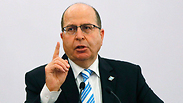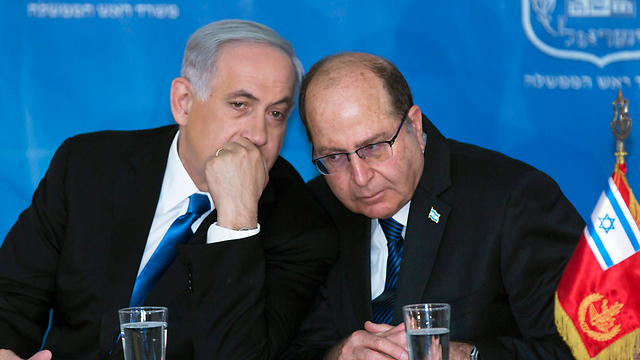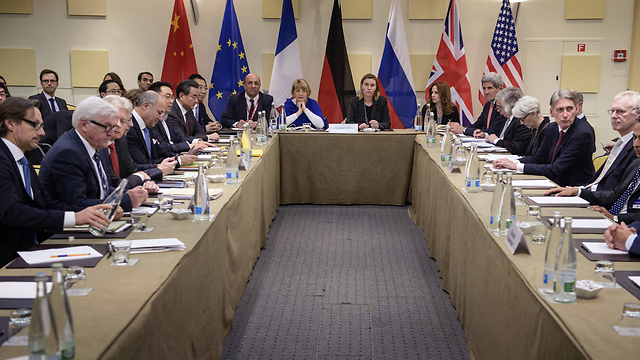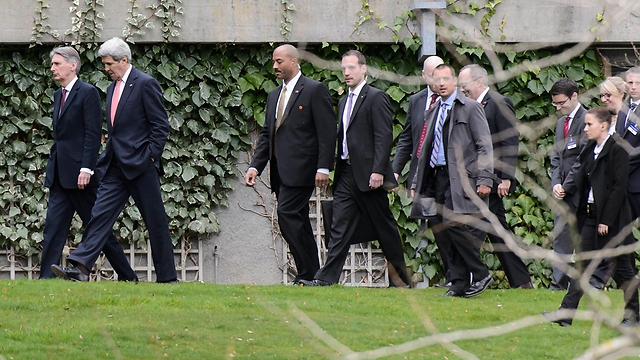
Israel lashes out at Iran deal as sides work frantically to reach accord
Kerry says Iran, world powers will work all night to work out 'tricky issues' as Israel's defense minister echoes Netanyahu in warning deal whitewashes Iran's support of terror, regional instability.
US Secretary of State John Kerry said Monday that he and his global counterparts would be working into the night to resolve "tricky issues" blocking a nuclear deal with Iran.
According to Kerry, "There still remain some difficult issues. We are working very hard to work those through. We are working late into the night and obviously into tomorrow," Kerry told a CNN reporter in Lausanne, adding "everyone knows the meaning of tomorrow" when a deadline for the outlines of a deal expires at midnight.
However, Defense Minister Moshe Ya'alon warned against the deal, which he described as "bad" as it would leave Iran poised to create nuclear arms.
"Iran is an evil regime which world powers are now giving a deal which is bad (because) it allows (Iran) to maintain some nuclear abilities while it continues to take over the Middle East," Ya'alon said in reference to events in Yemen.
Speaking to a religious website, Ya'alon said "today there is no one in the West that denies Iran had a nuclear military program, unfortunately, the they are choosing to deal with it not in the way we think it should be dealt with."
Earlier Monday Prime Minister Benjamin Netanyahu lashed out again against the negotiations, saying that the Islamic Republic was benefitting from its aggression.
"The emerging agreement in Lausanne sends a message that there is no price to pay for aggression, and conversely, there is a reward for Iran's aggression. The moderate and responsible states in the region, led by Israel and many others, are the first to be affected by this agreement," Netanyahu said.
Tuesday is the self-imposed deadline for Britain, China, France, Germany, Russia and the United States to strike a framework nuclear deal with Iran. That deal, if it can be reached, is supposed to be the basis for a final accord by the end of June detailing steps for Iran to scale back its uranium enrichment and other technology that could be used to make nuclear arms.
In return, Tehran would be rewarded with the easing of crippling economic sanctions.
Meanwhile, Iran would not necessarily have to ship its stockpile of highly enriched uranium abroad under a nuclear pact with major powers, US State Department spokeswoman Marie Harf said on Monday.
"You don't have to ship it out of the country to get to a year breakout time," she said in a conference call, referring to the goal of stretching the amount of time it would take Iran to acquire enough fissile material to make one atomic bomb.
"You can have some other dispositions for it that get us where we need to be in terms of our bottom line," Harf said.
Iran and six major powers are seeking to negotiate a deal under which Tehran would halt its most sensitive nuclear work in return for an easing of the economic sanctions crimping its economy.
Echoing earlier US statements, Harf said there was an even chance of reaching an agreement. "We still see a path to get a political understanding," she said. "There is still a path to do this. I would probably say (a) 50-50 chance we will get it done."
While several officials have told Reuters that Iran indicated willingness to send most of its enriched uranium away for storage in Russia, senior Iranian negotiator Abbas Araqchi said on Sunday that sending stockpiles abroad "was not on Iran's agenda."
Officials in Lausanne say the sides are advancing on points that discuss cuts and limits to aspects of Iran's enrichment program. Over the past weeks, Iran has moved from demanding that it be allowed to keep nearly 10,000 centrifuges enriching uranium, to agreeing to 6,000. Tehran may now be ready to accept even fewer but is said to be pushing back on how long it must limit the technology it could use to make atomic arms.
It also insists that sanctions be lifted immediately as part of a deal. The Obama administration wants to suspend or remove them more slowly.
The United States says any deal will stretch the time Iran would require to make a nuclear weapon from the present two-to-three months to at least a year. But critics question that, and object that such an agreement would keep Tehran's nuclear technology intact.
Iran and the six powers at the table have moved close on what to do with a nearly built reactor that was also a proliferation concern because it would have produced enough plutonium for several nuclear bombs a year. The facility would be re-engineered to generate only a fraction of the material.
Officials say the sides also are seriously discussing turning a formerly secret underground uranium enrichment plant into a facility that would make isotopes for medical, industrial and scientific uses.
If used for uranium enrichment the bunker would be a concern, because it is thought impervious to air attack – an option neither Israel nor the US have ruled out should diplomacy fail. But - although it would not be enriching uranium - the facility would use the same technology as for uranium enrichment, and critics say that leaves potential bomb-making infrastructure intact.
AFP and Reuters contributed to this report













